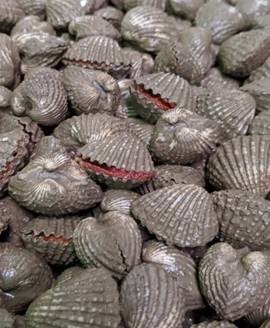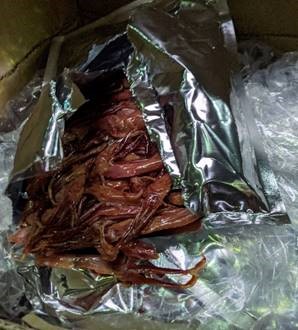Duck Tongues & Intestines
JAMAICA, N.Y. — On January 13, U. S. Customs and Border Protection Agriculture Specialists (CBPAS) at John F. Kennedy International Airport examined a shipment from China. During the course of the inspection, CBP agriculture specialists discovered more than 900 lbs. of prohibited avian meat (duck tongues and intestines) products, and nearly 265 lbs. of blood clams.
The prohibited duck tongues and intestines were seized and destroyed by CBP agriculture specialists in accordance with U. S. Department of Agriculture (USDA) regulations. The blood clams were turned over to the National Oceanic and Atmospheric Agency (NOAA).
In total CBP agricultural specialists seized approximately 600 lbs. of fresh duck tongues and a little more than 330 lbs. of frozen duck intestines, and 260 lbs. of live blood clams.
“CBP Agriculture Specialists are the first line of defense to prevent the introduction of animal diseases that have the potential to cause significant damage to the Nation’s agricultural economy,” said Troy Miller, Director, Field Operations, New York Field Office.
 According to USDA’s Animal and Plant Health Inspection Service, China is a country affected by African Swine Fever (ASF), Classical Swine Fever (CSF), Newcastle Disease (ND), Foot and Mouth Disease (FMD), Highly Pathogenic Avian Influenza (HPAI) and Swine Vesicular Disease (SVD).
According to USDA’s Animal and Plant Health Inspection Service, China is a country affected by African Swine Fever (ASF), Classical Swine Fever (CSF), Newcastle Disease (ND), Foot and Mouth Disease (FMD), Highly Pathogenic Avian Influenza (HPAI) and Swine Vesicular Disease (SVD).
Blood clams are regulated by the U.S. Food and Drug Administration (FDA) because these animals can live in anoxic environments and therefore can pass along diseases such as typhoid and hepatitis to those handling or consuming them.
Agriculture is the largest industry and employing sector in the U.S. with more than $1 trillion of economic activity annually. The greatest risks of success of this industry are exotic plan pests and foreign animal diseases. On a typical day in fiscal year 2019, CBP agriculture specialists intercepted 314 pests at U.S. ports of entry and 4,695 materials for quarantine: plant, meat, animal byproduct, and soil. Learn how CBP protects American Agriculture.

